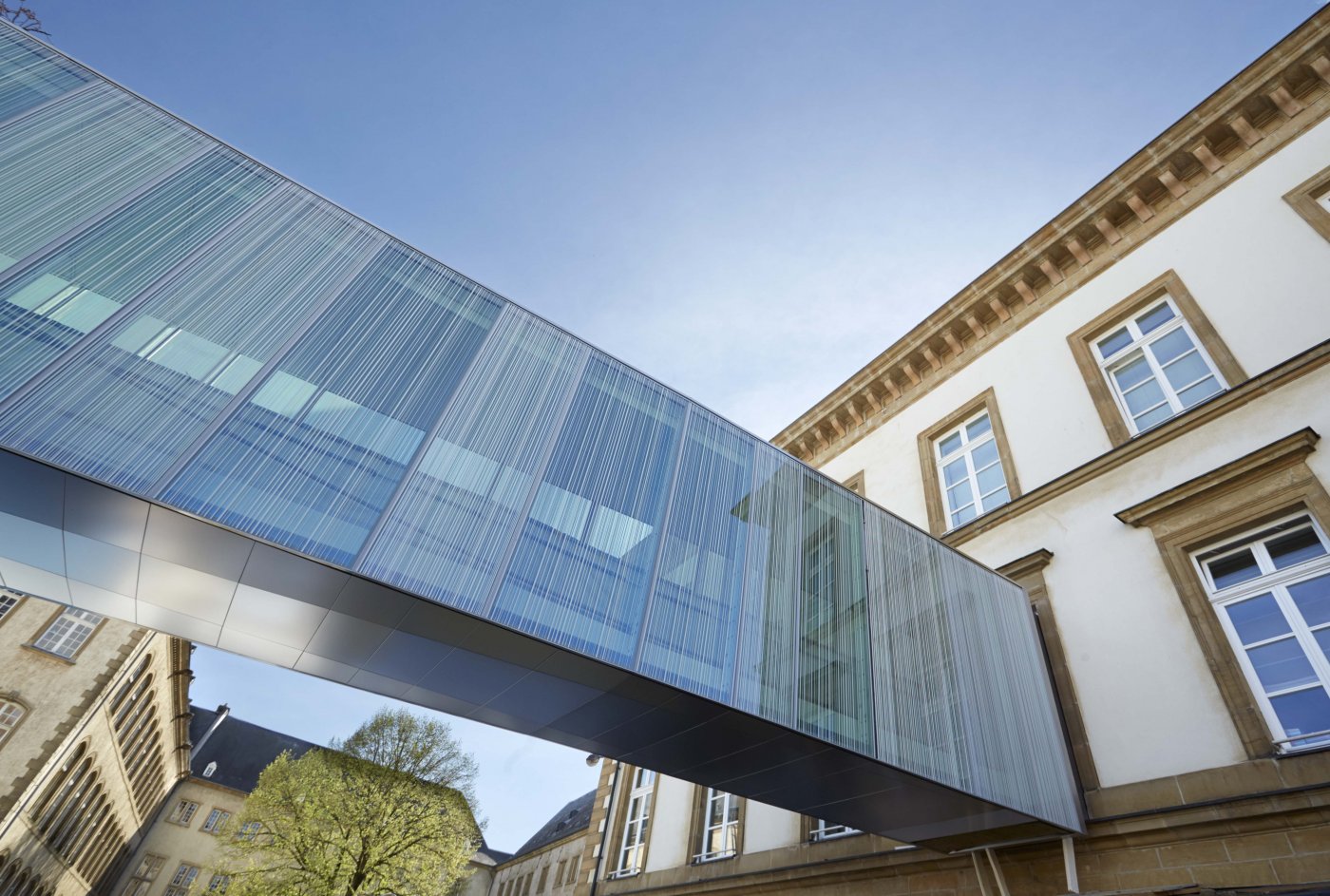Summary record
Video
Activities of the Service Sports this summer
Question posed by Tom Krieps
Allow me to return to the matter of the activities organised by the Service Sports (Sports Department) over the summer ("Sport-Wochen).
The decision was made some time ago to simply cancel all outdoor activities, and frankly, not everyone was thrilled about it.
However, the Government has recently stated that outdoor activities are to be allowed, albeit with restrictions in place.
- Would you not agree that the City of Luxembourg could use the opportunity to revive the "Sport-Wochen" by allowing the Service Sports to hold its sporting activities now that lockdown restrictions have been eased? In particular, I am thinking of activities such as mountain biking.
Response provided by Simone Beissel
A huge amount of effort goes into putting on the "Sport-Wochen". This means that, unfortunately, it will not be possible to stage these activities this summer. Typically, the programme includes 19 sports camps for children aged 11 to 17, as well as activities for senior citizens. These sports camps are not comparable to simple holiday camps. Preparations begin in September for the following summer's activities.
It was necessary to cancel the events in light of the public-health crisis.
Personnel from the Service Sports were seconded to work in foyers scolaires during the COVID-19 crisis, and not all of these members of staff have yet returned to their usual posts. Contracts with the partners and sponsors have already been cancelled.
In addition, children are supervised by freelance instructors, or by students, and a number of sports clubs contribute to the programme by making infrastructure or trainers available. Given that organising this event is very complex, it has not been possible to revive the programme for summer 2020. However, the City plans to stage "Sport-Wochen" in 2021.
Catering in foyer scolaires
Question posed by Guy Foetz
I would like to put the following questions to the college of aldermen regarding catering in municipal foyers scolaires:
- Which companies are currently responsible for the catering provided at the various foyers scolaires? Please provide details for each foyer scolaire, and the dates of each contract.
- Where do the ingredients for the meals come from (i.e. what is their geographic origin), and on average, what percentage of these are organically produced?
- What is the current level of food waste (in kilogrammes per week) across all foyers scolaires? Are there notable differences from one foyer scolaire to another?
- Since mid-2017, the Service Foyers scolaires (Childcare Department) has used the buffet system as a model for catering in all the City's foyers scolaires.
How has this new system affected levels of child satisfaction and food waste? - Do the children and their parents have any say regarding the food that is served?
Response provided by Colette Mart
For many years, meals for foyers scolaires have been supplied by two external contractors:
- Dussmann supplies the meals for the foyers scolaires in Beggen, Dommeldange, Eich, Kiem, Cents, Hamm, Gare (Pinocchio), Neudorf, Grund, Bonnevoie/Rue du Verger, Bonnevoie/Rue des Prés and Bonnevoie/Rue Demy Schlechter,
- while the meals for the ones in Cessange, Gasperich, Gare/Rue Adolphe Fischer, Gare/Rue de Strasbourg, Bonnevoie/Rue Jean-Baptiste Gellé, Merl, Belair/Rue Charles IV, Belair/Rue Aloyse Kayser, Hollerich, Limpertsberg, Eich/Sept-Arpents and Rollingergrund are supplied by Sodexo.
The percentages of organic produce vary depending on the category of foodstuff:
- vegetables: variable, between 10% and 12% organic, supplied by Sodexo in 2019;
- snack (vegetables): 100% organic;
- fruit: at least 10%;
- snack (fruit): 100%;
- meat: at least 10%;
- poultry: 100% in certain foyers scolaires;
- eggs: organic or Luxembourg-produced;
- chocolate: 100% organic.
The terms and conditions specify that ingredients must be sourced from within a 150-km radius of Luxembourg City. Other criteria also govern the choice of ingredients (e.g. Fairtrade certification; MSC certification for salmon). In addition, fine local products are chosen when it comes to beef and pork.
In 2019, a survey on leftover food was conducted among foyer scolaire managers, and we do indeed see major differences from one centre to another, notably in view of the centres' differing capacities.
When the buffet system was introduced, the guidelines issued by the Ministry of Education (Ministère de l'Éducation nationale) on grammage were followed. No major problems were highlighted. The suppliers take the leftover food away.
During enrolment, children can choose between the standard menu of the day, the vegetarian menu and the pork-free menu. Each day, they can choose between a meat dish, a fish dish and a vegetarian dish. They can also combine the options if they wish. In addition, there are working groups in place focusing on the menus on offer, and staff can pass on the children's comments for consideration. Since 2019, the foyers scolaires can also choose whether they wish to serve cooked or raw vegetables.
Accessibility of parking spaces for persons with reduced mobility
Question posed by Guy Foetz
For a person with reduced mobility, finding a parking space in Luxembourg City is no easy task. When you finally find one, there is no guarantee that it will be sufficiently accessible for your needs.
Indeed, with certain vehicles, wheelchairs can be loaded and unloaded directly to and from the pavement, from the side of the vehicle. In most cases, though, as is the case with the NOVABUS, EDIFF transport or service cars used by home help services, the vehicle must be loaded from the rear.
This means that when planning parking spaces for persons with reduced mobility, it is important to ensure they are at the beginning of the row, rather than sandwiched between two other parking space.
To clarify what I am saying, I refer once again to the following parking spaces, about which a question was posed on 16 June 2015, but for which no viable solutions have yet been found:
- 2, rue Dicks
- 41, rue Victor Hugo
The trees planted near these two parking spaces mean that they cannot actually be used by a rear-loading wheelchair-accessible vehicle (please refer to the attached two photos).
Under the terms of article 9 of the municipal council's internal rules and regulations, I would therefore like to know:
- How does the Service Parcs (Parks Department) select parking spaces for persons with reduced mobility?
- What are the typical dimensions of one of these parking spaces?
- How many spaces that are suitable for a rear-loading wheelchair-compatible vehicle are currently available?
Response provided by Patrick Goldschmidt
Currently, the City has 385 parking spaces for persons with reduced mobility. Some of these spaces have been installed at the request of a business, an association or a private individual. In almost all cases, such requests are approved by the Service Circulation (Traffic Department). These spaces are not privately reserved; instead, they can be used by anyone with reduced mobility.
The remainder of the spaces for persons with reduced mobility have been installed by the City administration in the vicinity of places such as shopping centres and pedestrian zones.
The City follows the international guidelines regarding the length of such parking spaces. They are at least 7 metres long, and the spaces are usually installed for the private cars of persons with reduced mobility. For the rear loading of wheelchairs into minibuses, the space must be at least 10 metres long.
Alderman Goldschmidt recommends that people in a similar situation contact the City's Service Circulation to find a solution. For example, the Service Circulation will always provide a suitable solution for people using a minibus to get around on a day-to-day basis (either by installing an appropriate parking space, or by granting a licence to double park for the time taken to load or unload).
Remote working
Question posed by Cathy Fayot
I would like to put the following question publicly during the next meeting of the City of Luxembourg's municipal council.
During the lockdown, many businesses across a wide range of sectors organised themselves to allow their employees to work remotely, where possible.
As a forerunner in remote working, the City of Luxembourg also encouraged and supported its staff in working from home.
In light of this, I would like to ask the following questions:
- How many people – civil servants and City of Luxembourg employees – have been able to work from home?
- Did these people have access to IT hardware provided by the City of Luxembourg?
- Does the administration intend to survey its employees to see how many of them wish to continue working remotely?
To facilitate effective remote working under the right conditions, it is important that workers have access to a high-performance fibre-optic or 5G network.
- What are the City of Luxembourg's capabilities in terms of high-performance connectivity, and which fibre-optic network does it use?
- Is it possible to measure whether the network still has sufficient free space, and determine the point at which there is a danger of overloading it?
- What plans are there to increase capacity and upgrade networks, which will benefit all users?
Response provided by Lydie Polfer
Prior to the pandemic, some 100 members of City of Luxembourg staff worked from home on a regular basis (61 men and 39 women). At that time, remote working was limited to 8 hours per week, and 15% of the staff of the department in question.
However, the situation changed considerably during the pandemic, given that we needed to ensure the municipal departments could continue to serve the citizens effectively during lockdown. The number of connections to the City's secure VPN (Virtual Private Network) surged from 330 before the COVID-19 pandemic to 820 on 25 June 2020, and the municipal personnel have done an exemplary job of managing the situation whilst working from home.
Conclusions will be drawn on the basis of a questionnaire to be completed by staff, and a survey conducted among heads of department to highlight the pros and cons of remote working in terms of the different tasks that need to be accomplished.
For example, one of the benefits is that congestion on the roads is eased. On the other hand, the drawbacks include lack of social contact in the workplace and the lack of customers for shops and restaurants.
The college of aldermen intends to extend remote working for those positions where it is appropriate, and an in-house working group will draw the necessary conclusions over the next few months. People considered vulnerable may continue to work remotely insofar as the nature of their work allows them to do so. Ultimately, of course, the aim is to organise matters so as to best serve the needs of our residents.
Finally, the City's computer networks are robust enough to cope with the increased number of people working remotely.
Civic engagement as part of the redevelopment of Rue Jean-Baptiste Gellé
Question posed by Christa Brömmel
A resident information meeting was held on 24 September 2019 in relation to the infrastructure work to be done in and around Rue Jean-Baptiste Gellé. At that meeting, residents asked that the City take the opportunity to rethink the arrangement of the streets bordering the elementary schools with a view to moderating traffic flow and making the public space safer for adult and child pedestrians, cyclists and scooter users. A proposal was made to plant trees and install appropriate street furniture, and the college of aldermen promised to get back to the citizens with concrete proposals. However, work has already commenced.
In light of this, I would like to ask the following questions:
- Will the requests and suggestions made by the residents be taken into consideration?
- When does the college of aldermen intend to present its proposals to the residents?
- In view of the current public-health situation, might it be feasible to conduct the civic consultation online?
Response provided by Simone Beissel
The subject of the residents' meeting organised in September 2019 was Rue Jean-Baptiste Gellé, Rue Xavier de Feller, Rue Henri Vannérus and Rue Marguerite-Séraphine Beving. The original plan was to present residents with the City's concrete proposals on 2 April 2020, but this meeting has been postponed to autumn 2020 in view of the COVID-19 crisis.
The documents will not be posted online prior to the public meeting, as the City wishes to discuss its proposals with the residents face to face.












